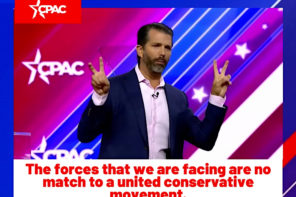The Values Voters Summit, the annual conference of the Family Research Council and other religious right groups, has drawn over 2,000 activists this year, who seem warmly receptive to uniting their culture war issues with the tea party movement.
That’s a trend, of course, rooted in the religious right’s efforts to portray constitutional rights as divinely ordained, and a government that is exceeding authority they claim was given it by God. See my dispatch from Ralph Reed’s conference last weekend.
But to win over this crowd, the presidential hopefuls — and tea party king- and queenmakers like Michele Bachmann and Jim DeMint — have to know how to preach it. That was something that some speakers this morning — DeMint and Bachmann, as well as Mike Huckabee and Mike Pence, had down. They all tapped into the “founding principles,” “Judeo-Christian” foundation, and other code, but they did more. They wept; they told stories about soldiers and family members; they evoked imagery of mountains climbed and enemies vanquished.
Mitt Romney, though? Not so much. Speaking directly after Pence, who since the inaugural Values Voters Summit in 2006, has always invoked the language of the religious right base, Romney was at a disadvantage. He was boring, technocratic, and business-like, and the audience wasn’t buying his claim to be on their side on abortion and gay marriage.
In contrast, Huckabee knew how to play the big-bad government card, claiming that the crisis we face is not “fiscal,” but “moral” — in other words, if everyone was just good and “Judeo-Christian” we wouldn’t need financial regulation. (Good luck with that!) See, for Huckabee, if people were moral, then there wouldn’t be juvenile delinquency and we wouldn’t spend government money on programs for juvenile delinquents. It’s a common refrain on the right now — especially as the religious right — that economic prosperity flows from everyone falling in lock-step with their “Judeo-Christian values.”
It’s why the Manhattan Declaration is the religious right’s core document right now — and why they’d like tea partiers to get on board with it.
Huckabee elaborated: “the bigger problem with the Democrats,” he said, “is not that they don’t share our values but that they don’t share our story” — in other words, not just their version of American history, and the intentions of the founders, but their story of what government is supposed to do and not do.
And that story, as Bachmann told it, is oft-repeated claim that our constitutional rights derive from God. “When the people fear the government,” she said, “there is tyranny. When the government fears the people, there is liberty.”
Pence’s version: “a nation conceived in liberty has come of age in bondage to big government.”
“When you have a big government, you’re going to have a little god,” was DeMint’s take on this liberty-tyranny dialectic, “and a cult that has to be controlled by big government.”
“God never intended the government to raise our kids,” was Huckabee’s rather meaningless conclusion — but one that resonated with this audience.
Pence maintained that we’re in trouble because “people in authority have walked away from timeless truth,” meaning the Bible (or at least his interpretation of it).
This is the narrative, or the story, Romney doesn’t get, which is why the audience drifted off as he spoke, and then emptied the hall for lunch.




